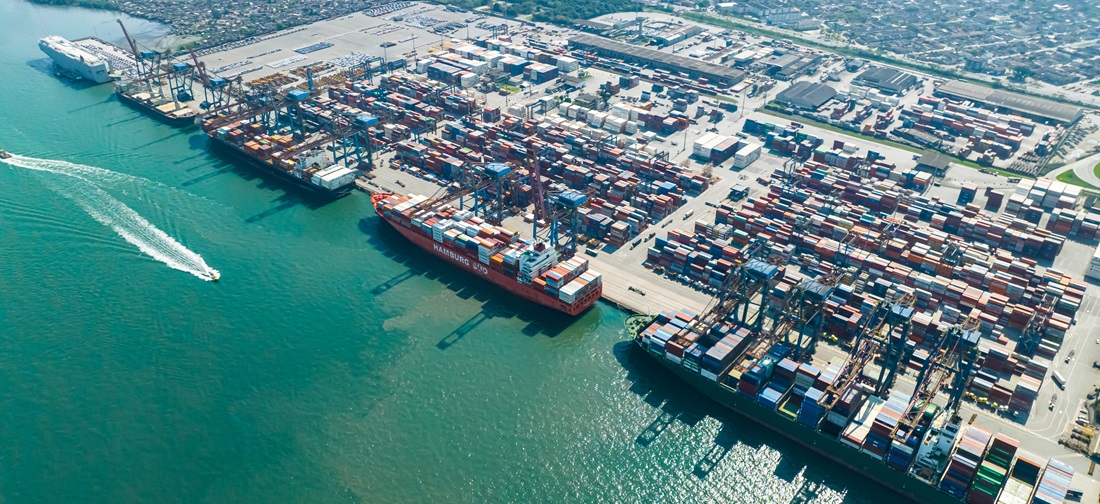
Santos Brasil Launches Climate Transition Plan to Achieve Carbon Neutrality by 2040
Oct, 31, 2024 Posted by Gabriel MalheirosWeek 202441
In a drive to become carbon-neutral by 2040, Santos Brasil has unveiled its Climate Transition Plan, outlining key directives and commitments to cut greenhouse gas (GHG) emissions by 70% in its direct operations (Scopes 1 and 2) and by 30% in its indirect emissions (Scope 3, linked to its supply chain). The plan aims to mitigate adverse climate effects through short-, medium-, and long-term targets and any emissions that remain by the target date will be offset through compensatory measures.
One of the plan’s most impactful initiatives is replacing diesel-powered RTGs (rubber-tired gantry cranes) at Tecon Santos, the company’s main terminal, with electric models by 2031. This upgrade is part of an ongoing terminal expansion and modernization project that began in 2019 with investments exceeding R$2.5 billion, of which R$1.2 billion has already been invested. Replacing the RTGs will prevent 713 tonnes of CO₂ emissions each month, reducing emissions by 97% and significantly advancing climate goals.
The new plan builds upon Santos Brasil’s five-year decarbonization program, which has already reduced emissions intensity from 13.74 kgCO₂/TEU in 2019 to 9.14 kgCO₂/TEU in 2023, a 36% reduction across Scopes 1 and 2.
Immediate targets include operational optimizations like fuel efficiency and localized emissions reduction, while medium- and long-term goals target deeper structural changes. These include a complete energy matrix shift at terminals, renewable energy through solar panel installations, value-chain engagement, and climate adaptation actions.
Transition to Electric Equipment
Over the next seven years, Santos Brasil will acquire 32 electric RTGs (e-RTGs), with eight currently in procurement, for Tecon Santos, one of Latin America’s largest container terminals. Last year, the company received the first eight of these next-generation machines, investing R$130 million in the equipment and R$12 million in yard upgrades.
The terminal currently operates 47 RTGs—39 diesel-powered units, which will be phased out by 2031, and eight electric models. Remote operations of the new equipment, set to begin later this year, will enhance safety, allowing workers to manage cargo handling from a control center rather than operating at crane height.
Another major step in Tecon Santos’ energy transition involves implementing shore power by 2031, enabling docked vessels to switch off their engines and rely on electric power, eliminating fossil fuel burning during port operations, and lowering the company’s Scope 3 emissions. Currently, about 70% of Santos Brasil’s emissions stem from Scope 3, largely from docked vessels. While demand for shore power is not yet present, Santos Brasil will be ready when it emerges.
Since 2022, the company has offset its Scope 2 emissions (energy use) through I-REC certificate purchases. The new plan also includes installing solar panels to generate power at the Vila do Conde (PA) and Santos container terminals.
Solid waste management is a critical target, with Santos Brasil aiming for zero landfill waste across all facilities by 2028.
Strategic Pillars
Santos Brasil’s Climate Transition Plan is based on its 2022 GHG inventory, developed with the consultancy of Instituto Via Green, which calculated the company’s emissions at 100,185.07 tonnes of CO₂ equivalent (Scopes 1, 2, and 3).
The company’s mitigation strategies are grouped into nine pillars: sustainable transportation and equipment—including the replacement of diesel vehicles with natural gas vehicles (NGVs) and diesel equipment with electric alternatives; renewable energy; energy efficiency; waste management; water efficiency; green financing and innovation; engagement and training; partnerships with stakeholders; and monitoring initiatives. These measures adhere to international recommendations, covering governance, strategy, target-setting, risk, and opportunity management in climate action.
As a UN Global Compact signatory since 2013 and a member of Brazil’s B3 Corporate Sustainability Index (ISE), Santos Brasil has been recognized for its pioneering sustainability efforts in infrastructure. In 2019, the company set ambitious environmental goals for 2020-2024, exceeding them last year with a 36% reduction in GHG emissions, 41% less water consumption, and 50% less waste generation.
Antonio Carlos Sepúlveda, CEO of Santos Brasil, acknowledges the challenges ahead but emphasizes the company’s assertive strategy, which is committed to environmental and social values. “Last year, two extreme weather events—the drought in the Amazon and heavy rainfall in Santa Catarina—challenged our operational performance, prompting us to implement adaptation measures. This reinforced our belief in the need for swift and effective responses to environmental impacts. It’s our commitment to ensure a promising future for the next generations,” Sepúlveda stated.
-
Ports and Terminals
Jun, 29, 2021
0
60 Latin American fruit containers blocked at Spanish port
-
Fruit
Jun, 21, 2024
0
Brazil finalizes phytosanitary agreements to export grapes to China
-
Ports and Terminals
Aug, 15, 2019
0
Port of Santos: Former area of Libra Terminals will be divided
-
Ports and Terminals
Oct, 21, 2022
0
Brazil court of justice to judge BRL 88 mln suit against the Port of Navegantes



